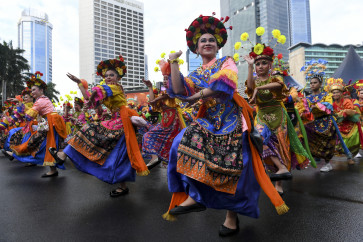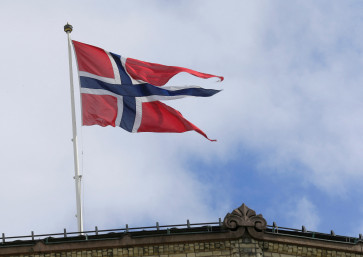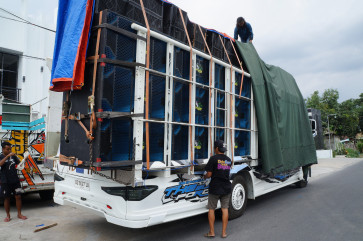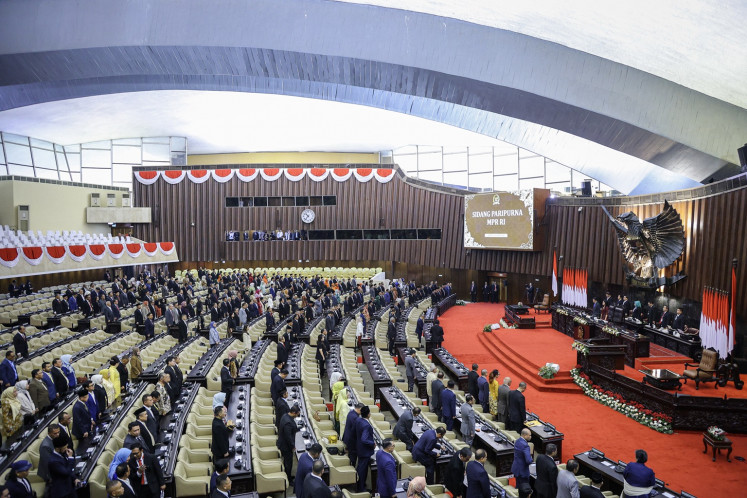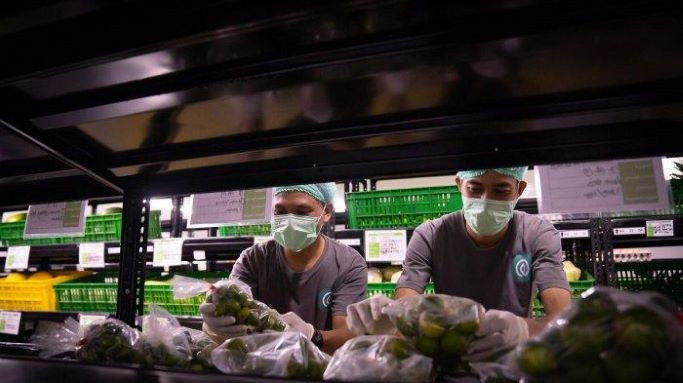Popular Reads
Top Results
Can't find what you're looking for?
View all search resultsPopular Reads
Top Results
Can't find what you're looking for?
View all search resultsBaby Jim Aditya: A woman on a mission
Courtesy of Baby Jim AdityaIt’s tough banging one’s head against the wall, but Baby Jim Aditya seemed none the worse for wear
Change text size
Gift Premium Articles
to Anyone
C
span class="caption" style="width: 398px;">Courtesy of Baby Jim AdityaIt’s tough banging one’s head against the wall, but Baby Jim Aditya seemed none the worse for wear. The 49-year-old HIV/AIDS activist has fought uphill battles and challenged deep-rooted prejudices in society for almost three decades.
Baby cut her teeth in social activism in the most difficult environment — she is a Muslim woman striving to fight the spread of HIV/AIDS within the patriarchal structure of Indonesia. Is it any wonder that she has taken a firm feminist stand in her fight?
Baby speaks loudly about issues directly related to the spread of HIV/AIDS such as infidelity, prostitution, gender bias and drug abuse. She is also unapologetic when speaking about sexual orientation and sexual behavior among teenagers.
The things she has done in the fight against HIV/AIDS have ranged from the awe-inspiring to the downright ridiculous. She spent days living with sex workers in red-light districts to educate them about HIV/AIDS. She distributed condoms among intercity truck drivers on Java’s northern coastal highway (Pantura), where the hanky-panky sex business thrives.
“I also frequently visit prisons to educate the inmates about the danger of used needles and unprotected sex. Another thing I do is go to schools to give basic sex education and raise awareness about HIV/AIDS,” she said.
The mother of two has held on to her convictions and idealism in the face of the conservative, while keeping her optimism and sense of humor intact. One must wonder what drives her to be so persistent.
“My source of inspiration is my family – my husband and two sons. At home we have open, liberal and even radical discussions about society. Their input and support keeps me going,” she said.
Born to a construction engineer father and a full time mother in Jakarta, Baby is the eldest of seven children. Her father passed away when she was in her second year of high school. To help support her family, Baby worked as a deejay at the Bogor-based Victory radio. It was during her stint here that she met legendary songstresses Vina Panduwinata and Betharia Sonata.
Baby has always been a restless soul full of energy. One job, she said, has never cut it for her. She needs to do two or more jobs to keep her sanity.
“I have to say that I’ve always been a person who juggles,” she admitted.
In the 1980s, for example, Baby, who had moved to Jakarta, built a career as a deejay at Prambors, Mustang and then Ramako. At the same time, she also made her name as a stage actor with theater KOMA.
Toward the end of the 1980s, she also dabbled as a news anchor at TVRI. When she was pregnant with her second child in 1989, she decided to quit the radio.
In 1990, she worked at as scriptwriter. A year later she took up fashion at the Susan Budihardjo school, which was followed by a garment business that catered to the expatriate market.
The new millennium saw Baby venturing into the food business. She opened a few food stalls and employed former convicts to run them.
Yes, Baby wears many hats.
But when it comes to her activism concerning HIV/AIDS, Baby, who in 2002 founded the Partisan Club, a non-profit organization that is concerned with the wellbeing of prisoners and the future of people living with HIV/AIDS, has shown nothing but consistency.
Her involvement with HIV/AIDS started in 1988 just a year after the first HIV positive individual, a sex worker, was detected in the country.
“I always have a soft spot for the marginalized in society. When I first got involved with theater KOMA in 1981, I had socialized with sex workers and street gangsters around Kramat Jati. I needed to get to know them in order to play my part on stage,” she said.
And when she met her husband Jim in 1983, they both shared the same concerns about HIV/AIDS. Both liberal-minded and exposed — they shared an interest in music, pop culture and sociopolitical issues — the duo knew that HIV/AIDS could pose a threat to Indonesian society sooner than anyone would like to admit.
“The resistance to acknowledging the social problems in which HIV/AIDS breeds is the most fundamental issue we faced then. And now, three decades later, we still have the same issue!” she said, rather pointedly.
To fight HIV/AIDS, she explained, we must first understand human sexual behavior. And this can only be done thoroughly when we manage to put aside our prejudices.
“By human behavior I don’t necessarily mean sexual orientation. I’m talking about cheating husbands, uneducated sex workers, drug users, families in Indramayu and Kuningan that encourage their daughters to work as prostitutes — these are the more urgent matters we conveniently shrug off,” she lamented.
“Do you know that housewives are the most vulnerable group to HIV/AIDS today? And do you know why? Because their husbands cheat on them with prostitutes and nobody wants to talk about it. But it’s a fact,” she explained.
Intercity truck drivers across Pantura, Baby explained, are among those at high risk for HIV/AIDS because of their habit of having unsafe sex with different sex workers. This, in turn, puts their wives and unborn children in danger of being infected by HIV.
The same goes for workers at Tanjung Priok, who often resort to unprotected sex with sex workers around Cilincing, North Jakarta. The transactions often happen underneath a flyover bridge not far from a row of tents in which sexual activity takes place.
“Not many people want to hear such a heart-wrenching fact about life. When I talk about it, I often get accused of promoting free sex or pornography — but if you listen to my words carefully, I talk about nothing more than the social problems that we have and how we can help stop them,” she pointed out.
Baby, who has a master’s degree in clinical psychology from the University of Indonesia, gets fiery when discussing the prevailing hypocrisy in today’s society.
She insisted that such hypocrisy is one of the factors that impedes the fight against the rapid spread of HIV/AIDS.
Baby gets hundreds of short messages from students, housewives and drug users seeking professional advice every day. Many ask for moral advice, but being the professional psychologist that she is, she usually just lends them her ear and shoulder.
“At the end of the day, they just need a friend and a mother who doesn’t judge them. They still have years to live despite their medical condition. And while they’re still around, why can’t we just be kind to them?” Baby said.
So what can we contribute as a society?
“First, stop trying to change people. Just start changing yourself. You have to leave your moral judgment at the door before entering a room full of people who are susceptible to HIV/AIDS,” said Baby.
Asked about her New Year’s resolution, Baby said she wanted to finish up her doctoral thesis in philosophy and start working on a shelter for people living with HIV/AIDS who don’t have the support of their families.


